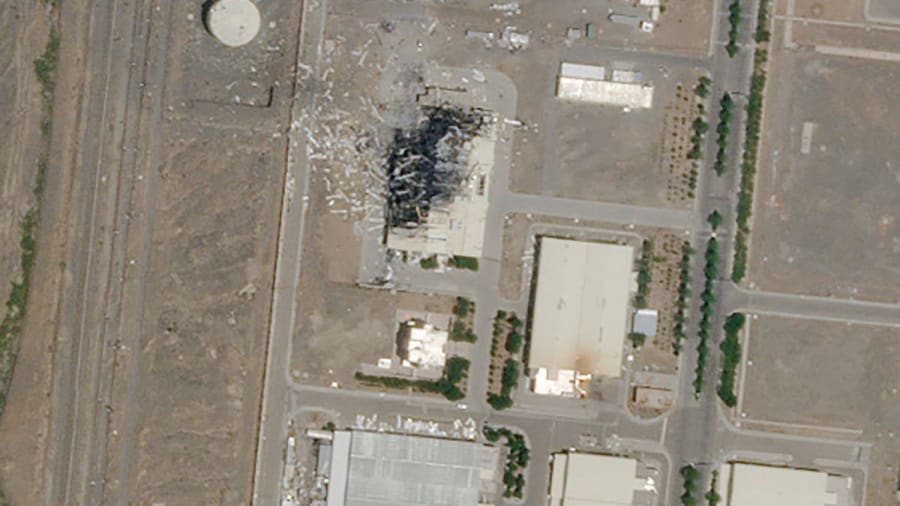‘Iran no longer a threshold nuclear state’ - US & Israeli strikes reportedly destroyed work on ‘electronic pulse’ bomb, set Iran back 1-2 years
Israeli sources claim half of ballistic missiles destroyed, say nuclear scientist position is 'death sentence'

Israel's Operation Rising Lion in June damaged not only Iran’s nuclear program, but also a secret project to develop an electromagnetic pulse (EMP) bomb the Washington Post reported.
According to the report, the Islamic Revolutionary Guards Corps (IRGC) pushed for the development of an EMP bomb as a way to circumvent a fatwa (religious ruling) by Supreme Leader Khamenei prohibiting the development of nuclear weapons. However, despite the fatwa, research and development towards nuclear weapons continued, in the event of a change in policy by Khamenei.
According to the Israeli and American officials cited in the article, Iran’s nuclear program was set back at least a year.
“Iran is no longer a threshold nuclear state,” an Israeli official told the Post’s David Ignatius.
The official reiterated estimates that Tehran would need one to two years to develop a usable nuclear weapon – assuming it could conceal its efforts. These estimates align with recent statements by U.S. officials.
Another key component of Israel’s efforts to disrupt the Iranian nuclear program was the targeting of key nuclear scientists involved in nuclear research in the Islamic Republic.
The opening strikes of Operation Rising Lion were the result of dedicated intelligence operations and complex military planning. Around 20 senior military and IRGC commanders were killed, along with 9 nuclear scientists in first wave of strikes on Iran during the 12-day war.
Those strikes were meant to significantly degrade Iran’s nuclear program, even in the event that the strategic nuclear sites could not be destroyed. Israeli officials now believe that the deaths of those top nuclear scientists could deter younger scientists from joining any attempt to revive the nuclear weapons program, seeing such a position as “a death sentence.”
Another focus of Israel’s strikes was Iran’s ballistic missile program and launching sites. While Iran continued to launch ballistic missiles at Israel throughout the 12-day conflict, the number of missiles per barrage dropped significantly following the first couple days of the war.
The Post report claims that around half of Iran’s stockpile of ballistic missiles, estimated at around 3,000 at the beginning of the war, was destroyed, along with about 80% of the estimated 500 missile launchers.
As with the retaliatory strikes in October 2024, Israel also targeted facilities involved in the manufacturing of ballistic missiles, to make Iranian attempts to restore its stockpiles more difficult. However, the Post report also stated that “an unwelcome surprise” for Israel was the discovery that Iran’s stocks of solid-fuel missiles were greater than estimated. Unlike liquid-fuel missiles, which must be fueled while on the launcher, solid-fuel missiles require no fuel loading after being placed on the launcher, and are able to be set up and launched much more quickly. Solid-fuel missiles are also harder to target in flight, the Israeli officials told Ignatius.
Israel had early success targeting liquid-fuel missiles, as they require deploying and positioning before the loading of fuel. That extra time exposes the launchers to targeting for a much longer period, allowing Israeli fighter jets and drones to destroy many before the missiles had launched.
An additional revelation of the article, is that U.S. President Donald Trump gave Israel the green light to launch the attack on June 13, signaling that he would only join if the campaign was successful. However, Trump’s ceasefire declaration caught Israel off guard, as Israeli leaders were planning the final stages of attacks designed to overthrow the Islamic regime.
An outstanding question for the Trump administration is the issue of a nuclear agreement between the U.S. and Iran, meant to replace the 2015 Joint Cooperative Plan of Action and guarantee that the Islamic Republic does not begin rebuilding its program. Iranian officials have refused to accept a ban on uranium enrichment, and President Trump recently indicated that he is open to further strikes on Iran, if the country attempts to restart its nuclear program.
So far, the U.S. and Iran have not announced any date for resuming nuclear talks between the two countries, however, the E3, consisting of the UK, France and Germany, could resume nuclear talks with Iran as soon as this week.
Those countries warned, in a statement together with the U.S., that if no nuclear agreement is reached by the end of August, they could trigger snapback sanctions against Iran.

The All Israel News Staff is a team of journalists in Israel.
You might also like to read this:
















